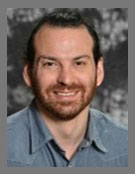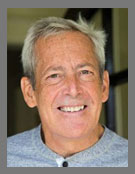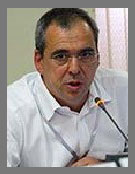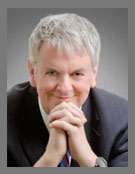

 David Putrino “How to be an Innovator: Exploring rehabilitation and human performance in the 21st Century” Lecture sponsored by
|
David is physiotherapist with a PhD in Neuroscience. He worked as a clinician in Australia, before moving to the United States to study computational neuroscience at Harvard Medical School, MIT and NYU. He has served as a faculty member at Weill-Cornell Medicine and Burke Medical Research Institute. He is currently the Director of Rehabilitation Innovation for the Mt Sinai Health System, and an Assistant Professor of Rehabilitation Medicine at the Icahn School of Medicine at Mt Sinai. He works to develop innovative technology solutions for individuals in need of better healthcare accessibility. He consults with the Red Bull High Performance division to use evidence-based technologies to improve athletic performance. He is also the “Chief Mad Scientist” of Not Impossible Labs, a group that creates technological solutions for humanitarian problems. David is the author of “Hacking Health: How to make money and save lives in the HealthTech world”, and his research has been featured on the ABC, Sport’s Illustrated, the Wall Street Journal, the BBC, Time Magazine, Wired and the LA Times to name just a few. See David Putrino speak here: Tedx // We don’t treat patients, we train superheroes | David Putrino | TEDxTorinoSalon |
Deborah Backus "Why Technology Innovation does not Equal Technology Adoption: Strategies for Successful Uptake" Lecture sponsored by |
Deborah Backus, PT, Ph.D., FACRM is director of multiple sclerosis research at the Shepherd Center in Atlanta, Georgia, and President of the ACRM (American Congress of Rehabilitation Medicine). She is a grant-funded investigator, physical therapist, and educator with over 30 years of experience in neurorehabilitation. Debbie’s mission is to empower patients, students and colleagues to achieve their highest potential and to advance rehabilitation science and care. She has led the charge for the evidence-based integration of technology into clinical practice and assisted with the development of strategies and research related to this. Debbie has extensive experience with innovative rehabilitation technologies, including body-weight supported treadmill systems, functional electrical stimulation interventions, and upper extremity robotic devices. Her research at the Shepherd Center primarily focuses on the investigation of rehabilitation interventions as well as models of care to facilitate greater function, health, and quality of life in people living with MS. She has presented both nationally and internationally related to her work, and her studies are published in a variety of peer-reviewed journals. Debbie received her BS in physical therapy from Boston University in Massachusetts and her Ph.D. in neuroscience from Emory University in Atlanta, Georgia. |

Mark Stephan "Recovery" Lecture sponsored by |
Official Website: http://www.stephanchallenge.com/ Learn more about Mark Stephan: Living Healthy Chicago: Inspiration Mark Stephan |
 Claude Tardif, Canada "Digital Transformation in Rehabilitation and Mobility Device Services: The Way Forward?" Lecture sponsored by
|
Claude Tardif originally qualified as Prosthetist – Orthotist. He has over 30 years of experience in rehabilitation and mobility device services, among which 20 years in low and low-middle incomes countries. In 1998, he started to work for the International Committee of the Red Cross (ICRC), where, in 2004, he was appointed as the Head of ICRC Physical Rehabilitation Programme, until 2016. Since 2016, he serves as Rehabilitation and Mobility Device Services Advisor, for the ICRC and for other organizations. He has been involved in the development of several guidelines published by WHO among which: The Priority Assistive Products List, the Standards for Prosthetics and Orthotics for Service Provision, the Guidelines for Health-Related Rehabilitation. In recent years, his works focused on how to improve the impacts of existing service providers. He is a member of the International Society for Prosthetics and Orthotics (ISPO) Executive Board, the Chair of the ISP Wheelchair Advisory Group, a member of the International Society for Wheelchair Professionals (ISWP) Advisory Board, Member of the Tanzanian Training Centre for Orthopaedic Technologist (TATCOT) Advisory Board and Chair of the African Federation of Orthopaedic Technologists (FATO) Scientific Committee. |
Katherine Kuchenbecker "Haptic Interactions Matter" Lecture sponsored by
|
Katherine J. Kuchenbecker directs the Haptic Intelligence Department at the Max Planck Institute for Intelligent Systems in Stuttgart, Germany. She earned her Ph.D. in Mechanical Engineering at Stanford University in 2006, did postdoctoral research at the Johns Hopkins University, and was an engineering professor at the University of Pennsylvania before she moved to the Max Planck Society in 2017. Her research centers on haptic interfaces, which enable a user to touch virtual and distant objects as though they were real and within reach, as well as haptic sensing systems, which allow robots to physically interact with objects and people. She delivered a TEDYouth talk on haptics in 2012 and has been honored with a 2009 NSF CAREER Award, the 2012 IEEE Robotics and Automation Society Academic Early Career Award, a 2014 Penn Lindback Award for Distinguished Teaching, and various best paper and best demonstration awards. She co-chaired the IEEE Technical Committee on Haptics from 2015 to 2017 and co-chaired the IEEE Haptics Symposium in 2016 and 2018. See Katherine Kuchenbecker speak here:TedED Haptography: Digitizing Our Sense of Touch Poptech 2011 |
 Geoff Fernie Professor at University of Toronto and Senior Scientist at the "Prevention is an Important Topic for Rehabilitation Researchers" "RESNA Colin McLaurin Distinguished Lectureship Award Lecture": Recognizes a scholar and leader who has made substantial and innovative contributions to the field of rehabilitation engineering and assistive technology through research, education, and/or practice.
Lecture sponsored by
|
Geoff Fernie, CM, PhD, PEng, CEng, FCAHS, is the Creaghan Family Chair in Prevention and Healthcare Technologies, Department of Surgery, University of Toronto and a Senior Scientist at the Toronto Rehabilitation Institute.
See Geoff Fernie speak here: |